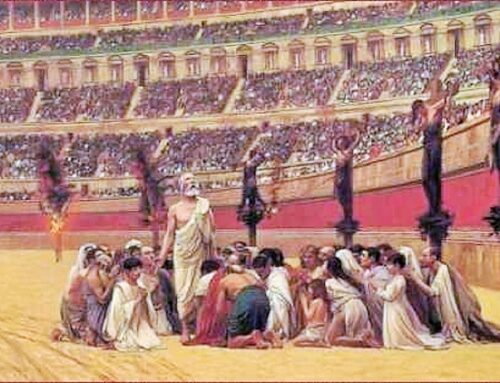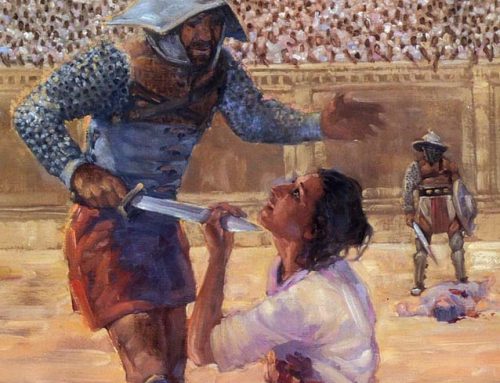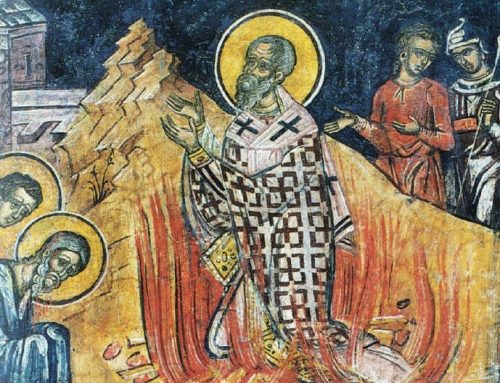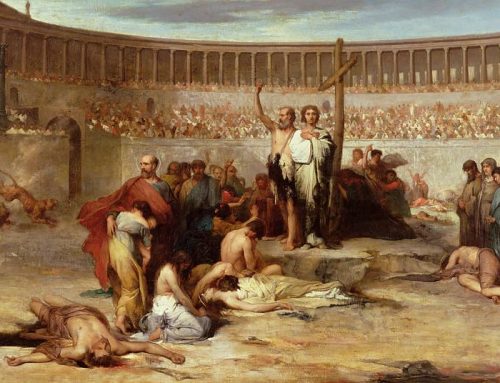2.1. An Illegal but Harmless Association
In 111 Pliny the Younger, governor of Bithynia on the Black Sea, was returning from an inspection of his rich and well-populated province when a fire devastated his capital, Nicomedia. Much could have been saved, had there been firemen.
Pliny reported to the emperor Trajan (98-117): “It is up to you to decide whether it is necessary to create a 150-strong association of firemen. For my part, I will make sure that such an association will accept only firemen. . .” Trajan replied rejecting the proposal: “Do not forget that your province is prone to societies of this kind. Whatever their name or purpose, I do not wish to have people united in a body, who then, for whatever reason quickly become an eterie. “The fear of the eterie (the greek name for associations) prevailed over the fires.
This was a phenomenon of ancient times. Associations of any type, which transformed themselves into political groups, had pushedCaesar into forbidding all associations in 7 B.C.: “Whoever establishes an association without special authorisation, is liable to the same penalty as those who, with armed forces, attack public places and temples.” The laws were still in force, but the associations continued to flourish; the boatmen on the Seine, the doctors of Avenches, the wine merchants of Lyons, the buglers of Lamesi. They all defended the interests of their members putting pressure on the public authorities.
Pliny was not slow to apply the interdict on eterie to a particular case presented to him in 112. Bithynia was full of Christians. “They are a crowd of people of all ages, and conditions, dispersed throughout the cities, in the villages and the countryside,” he wrote to the Emperor. He goes on to tell of a complaint received from the makers of religious amulets upset by the Christians who preached about the uselessness of such nicknacks. He had set up a special inquiry and found out that they had “the habit of gathering on a fixed day, before sunrise to sing a hymn to Christ as though to a god. They try to live justly, they oblige themselves by oath not to commit crimes, theft or robbery or adultery or deceit with words. They have the custom of dining together, and in spite of what others may say, the food is ordinary and harmless.” The Christians had not ceased having these meetings even after the governor had reissued the interdict against eterie.

Saint Ignatius of Antioch
Continuing the letter (10,96), Pliny assures the Emperor that he saw no malice in what they are doing. However, the refusal to offer incense and wine before the statue of the Emperor seemed to him an act of public sacrilege. The obstinacy of these Christians seemed “unreasonable and foolish”. From the letter of Pliny it appears clear that the accusations of ritual infanticide and incest had been droped out as absurd. There still remained the accusation of refusing to worship the Emperor (i.e. high treason) and of establishing an eteria.
The Emperor replied, “The Christians ought not to be sought out by the authorities. If, however, they are denounced and found guilty, they will have to be condemned.” In other words: Trajan encourages turning a blind eye to them: they are a harmless eteria like the boatmen on the Seine or the wine merchants of Lyon. But since Christians are practising an “unreasonable and foolish superstition” (as Pliny and other intellectuals of the time such as Epictetus said) and continued to refuse to do emperor worship (and thus were considered “outcasts” from civic life), Pliny should not pretend as if nothing happened. If they are denounced, they are to be condemned. Thus there continued the policy (even if in less rigid form) of “It is not legal to be Christians”. Certainly victim in this period were Simeon, the Bishop of Jerusalem, crucified at the age of 120, and Ignatius, Bishop of Antioch, carried to Rome as a roman citizen and executed there. The same policy towards Christians came to be adopted by the emperors Hadrian (117-138) and Antoninus Pius (138-161).
2.2. Marcus Aurelius: Christianity is folly
Marcus Aurelius (161-180), philosopher emperor, spent 17 of the 19 years of his reign fighting. In his Memoirs, which he wrote each night in his military tent, he recorded his thoughts “for himself”. He greatly despised Christianity. He considered it folly since it proposed to the common, ignorant people a certain manner of conduct (universal love, forgiveness, sacrifice for others without waiting for reward) which only philosophers such as himself could understand and practise through long meditation and discipline. His rescript of 176-7 prohibited fanatical sects, and the introduction of new cults so far unknown which might threaten the state religion. The situation for Christians, always grave, became even worse under him.

Roman Colosseum
The flourishing communities of Asia Minor founded by theApostle Paul were liable day or night to robbery and plunder by the mob. At Rome, Justin and a group of Christian intellectuals were condemned to death. The flourishing Christian community of Lyon was destroyed by accusations of atheism and immorality. (There perished under severe torture the very young Blandina and the fifteen year old Ponticus).
We realise that public opinion was hardening against the Christians. Great public calamities (such as war and plague) had raised the conviction that the gods were angry with Rome. When it became known that the Christians did not take part in the expiatory ceremonies ordered by the Emperor, popular wrath tried to find pretexts for raging against them.
This situation continued even into the first years of the emperor Commodus, son of Marcus Aurelius.
2.3. The lines of arguments used by anti-Christian intellectuals
In the reign of Marcus Aurelius, the offensive of the intellectuals of Rome against the Christians reached its peak.
“Frequently and erroneously – writesFabio Ruggiero – it is believed that the ancient world had combated the new faith with the weapons of law and order, in a word, with the persecutions. If this is true (and only in part) for the first century of the Christian era, it was no longer so in the second half of the second century. Both the gentile (=pagan) world and the Church understood, about the same time, the necessity of discussion and dialogue on the level of philosophical and theological argumentation. Ancient culture, trained for centuries in the subtleties of reasoning, could bring very sophisticated arguments against Christian teaching. Soon enough the Church itself, taking account of the force which classical thought could exert as a brake on the spread of the Gospel, understood the necessity of developing genuinely Christian philosophical and theological thought. At the same time this must be expressed in a language and in cultural categories intelligible to the graeco-roman world in which the Church was becoming more deeply involved.”
2.4. The lines of argument used by antichristian intellectuals
The arguments of Marcus Aurelius (121-180), Galenus(129-200), Lucian, PellegrinusProteus and especially Celsus (all of whom wrote their works in the second half of the second century) can be summarised as follows:
«”Salvation” from the insignificance of life, from disorder of events, from the annihilation of death, from sorrow, can be found only in a “philosophical wisdom” on the part of a highly intelligent elite.
The answer which Christians gave to this “salvation” as “faith” in a man crucified (like a slave) in Palestine (a border province) and declared to be risen, was folly. The fact that Christians believed in the message of this crucified one, adopting a preference for the outcasts and poor (the dregs of humanity) and preaching brotherly love for everyone (in a society tightly built in a pyramid and considered the ‘natural order’) was another intolerable folly, which everyone rejected. Christians had to be eliminated as the adversaries of human civilisation.»
The criticism of antichristian intellectuals was marked by the same idea of “revelation from above”, not based on “philosophical wisdom”; on Christian scriptures, which had contradicted history, and logic; on the “irrational” teachings; on the actions of the LOGOS of God that became man (Gospel of John) and submitted himself to death as a slave; on Christian morality (fidelity to marriage, honesty, respect for others, mutual help) which could be accepted by a small number of philosophers, but certainly not by the vast number of ignorant poor.
All of Christian teaching, for these intellectuals, was folly, since the claim of resurrection is folly (i.e. the claim of life after death), the preference God gave to the poor, and universal brotherly love. It.is all irrational.
The greek philosopher Celsus, in his True Discourse, wrote: «Accepting ignorant people, joining the vilest population, the Christians bring down the honourable and the noble, and finally go as far as calling everyone brother and sister without distinction…
The object of their veneration is a man on whom the most severe punishment was inflicted, and from the fatal wood of the cross is made an altar, as it is suited for depraved and
2.5. The measured response of Christians
For decades the Christians remained silent. They spread with the quiet force of the forbidden. With love and martyrdom they answered the most infamous accusations. It was in the second century that their first apologists (Justin, Athenagoras, Tatian) refuted with proofs the more outrageous of the charges, and sought to explain their faith (born in the Semitic lands and couched in “stories”) in terms culturally acceptable to a world imbued with graeco-roman philosophy. The “bricks” well suited to the message of Jesus Christ began to be organised into an architectural structure which could be regarded as Graeco-roman. It would be Tertullian in the West and Origen in the East (in the third century) who would impose systematic form on “Christian wisdom”.







Leave A Comment
You must be logged in to post a comment.